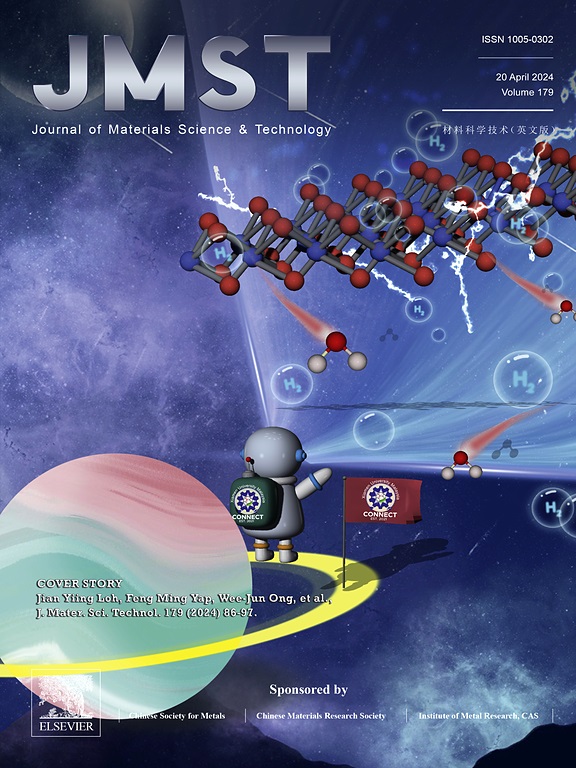Unveiling the mechanism of the carbon ordering and martensite tetragonality in Fe–C alloys studied via deep-potential molecular dynamics simulations
IF 11.2
1区 材料科学
Q1 MATERIALS SCIENCE, MULTIDISCIPLINARY
引用次数: 0
Abstract
The martensitic transformation plays a pivotal role in the strengthening and hardening of steels, yet an accurate interatomic potential for a comprehensive description of the martensitic phase formation in Fe–C alloys is lacking. Herein, we develop a deep learning-based interatomic potential to perform molecular dynamics (MD) simulations to study the martensitic phase transformation across a range of carbon (C) concentrations. The results reveal that an increased C concentration leads to a suppression of phase boundary movement and a deceleration of the phase transformation rate. To overcome the timescale limitations inherent in MD simulations, metadynamics sampling was employed to accelerate the simulations of C diffusion. We find that C atoms tend to cluster at distances equivalent to the lattice parameter of Fe with the same sublattice occupation, leading to local lattice tetragonality. Such C-ordered structures effectively inhibit dislocation movement and enhance strength. The stress field induced by dislocations facilitates a higher degree of ordering. The formation of C-ordered structures is identified as a potentially crucial strengthening mechanism for martensitic steels. The consistency between our simulation results and reported experimental observations underscores the effectiveness of the developed DP model in simulating martensitic phase transformation in Fe–C alloys, providing detailed insights into the mechanisms underlying this process.

通过深电位分子动力学模拟揭示 Fe-C 合金中碳有序化和马氏体四角化的机理
马氏体转变在钢的强化和硬化过程中起着举足轻重的作用,但目前还缺乏一种精确的原子间势能来全面描述铁碳合金中马氏体相的形成。在此,我们开发了一种基于深度学习的原子间势能,用于执行分子动力学(MD)模拟,研究碳(C)浓度范围内的马氏体相变。结果表明,碳浓度的增加会抑制相界运动并降低相变速率。为了克服 MD 模拟固有的时间尺度限制,我们采用了元动力学采样来加速碳扩散模拟。我们发现,在具有相同子晶格占有率的情况下,C 原子倾向于聚集在相当于 Fe 晶格参数的距离上,从而导致局部晶格的四边形。这种 C 有序结构可有效抑制位错运动并增强强度。位错引起的应力场有助于提高有序度。C 有序结构的形成被认为是马氏体钢潜在的关键强化机制。我们的模拟结果与报告的实验观察结果一致,这突出表明了所开发的 DP 模型在模拟 Fe-C 合金中马氏体相变方面的有效性,并为这一过程的内在机制提供了详细的见解。
本文章由计算机程序翻译,如有差异,请以英文原文为准。
求助全文
约1分钟内获得全文
求助全文
来源期刊

Journal of Materials Science & Technology
工程技术-材料科学:综合
CiteScore
20.00
自引率
11.00%
发文量
995
审稿时长
13 days
期刊介绍:
Journal of Materials Science & Technology strives to promote global collaboration in the field of materials science and technology. It primarily publishes original research papers, invited review articles, letters, research notes, and summaries of scientific achievements. The journal covers a wide range of materials science and technology topics, including metallic materials, inorganic nonmetallic materials, and composite materials.
 求助内容:
求助内容: 应助结果提醒方式:
应助结果提醒方式:


